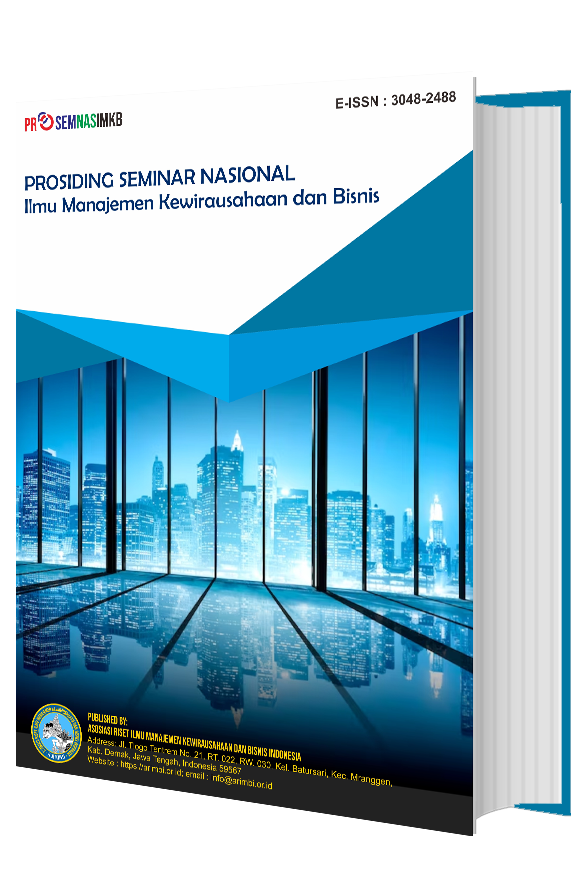Pengaruh Rasio Likuiditas dan Solvabilitas terhadap Profitabilitas pada PT GoTo Go-Jek Tokopedia Tbk Periode 2018-2023
DOI:
https://doi.org/10.61132/prosemnasimkb.v2i2.226Keywords:
Company Profitability, Corporate Liquidity, Debt to Assets Ratio, Debt to Equity Ratio, Return of AssetsAbstract
This study aims to analyze the effect of liquidity and solvency ratios on the profitability of PT GoTo Go-Jek Tokopedia Tbk. The liquidity ratio in this study is measured using the Current Ratio (CR), while the solvency ratio uses the Debt to Equity Ratio (DER) and Debt to Asset Ratio (DAR). The research data includes the 2018–2020 financial statements of PT Tokopedia Tbk and the years 2021–2023 after the company transformed into PT GoTo Go-Jek Tokopedia Tbk. The research method uses a descriptive quantitative approach with secondary data from the company's annual financial statements. The results show that the company's liquidity ratio fluctuates in the range of 1.55–3.14, while the DER is in the range of 0.12–0.42 and the DAR is between 0.17–0.34. The results of the simultaneous test showed the value of sig. The F Change of 0.003 < 0.05 indicates that CR, DER, and DAR have a less significant correlation relationship with Return on Assets (ROA). A determination coefficient value of 0.382 showed that 38.2% of the ROA variables were influenced by CR and DAR, while the remaining 67.8% were explained by other factors outside the model. Overall, the research findings confirm the importance of efficient debt management and optimization of capital structure to increase the company's long-term profitability.
Downloads
References
Bringham, E, dan Houston, J. (2014), Manajemen Keuangan II. Jakarta: Salemba Empat
Fahmi, I. (2018). Analisis kinerja keuangan. Alfabeta.
Harahap, S. S. (2015). Analisis kritis atas laporan keuangan (Edisi 11). Rajawali Pers.
Hery. (2019). Analisis laporan keuangan: Integrated and comprehensive edition. PT Grasindo.
Jogiyanto, H. M. (2017). Sistem informasi keuangan dan investasi. BPFE Yogyakarta.
Kasmir, (2016). Analisis Laporan Keuangan. PT. Raja Grafindo Persada. Jakarta
Munawir, S. (2014). Analisis laporan keuangan. Liberty.
Otoritas Jasa Keuangan. (2023). Laporan perkembangan fintech di Indonesia. OJK Press.
Prasetyo, B., & Trisyulianti, E. (2021). Digitalisasi ekonomi dan pengaruhnya terhadap pertumbuhan UMKM di Indonesia. Jurnal Ekonomi & Bisnis Digital, 3(2), 55–67.
Prijantoro A, Karamoy H, dkk (2022). Pengaruh Rasio Likuiditas dan Solvabilitas Terhadap Profitabilitas pada Perusahaan Manufaktur Sektor Industri Barang Konsumsi yang Terdaftar di BEI, Jurnal LPPM Bidang EkoSosBudKum (Ekonomi, Sosial, Budaya, dan Hukum) Vol. 5 No. 2 Januari-Juni 2022, 345 - 352
Purba D, Permatasari, P, dkk (2025), Analisis Perkembangan Ekonomi Digitial Dalam Meningkatkan Pertumbahan Ekonomi di Indonesia, Jurnal Ekonomi dan Perbankan Syariah, Vol. 10, No., 126-139, https://doi.org/10.30651/jms.v10i1.25367 Volume 10, No. 1, 2025 (126-139)
Sutrisno. (2017). Manajemen keuangan: Teori, konsep, dan aplikasi. Ekonisia.
Tandelilin, E. (2010). Portofolio dan investasi: Teori dan aplikasi. Kanisius.
Wibowo, A., & Arifin, Z. (2022). Pengaruh leverage dan likuiditas terhadap profitabilitas perusahaan manufaktur. Jurnal Manajemen dan Keuangan, 11(1), 1–12.
Yusuf, M., & Sari, N. (2020). Transformasi ekonomi digital dalam industri 4.0 di Indonesia. Jurnal Ekonomi Modern, 16(2), 144–156.
Downloads
Published
How to Cite
Issue
Section
License
Copyright (c) 2025 Prosiding Seminar Nasional Ilmu Manajemen Kewirausahaan dan Bisnis

This work is licensed under a Creative Commons Attribution-ShareAlike 4.0 International License.






